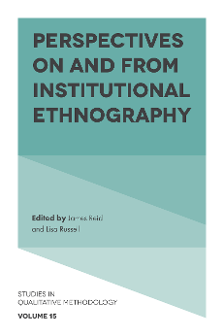
Index
Perspectives on and from Institutional Ethnography
ISBN: 978-1-78714-653-2, eISBN: 978-1-78714-652-5
ISSN: 1042-3192
Publication date: 17 November 2017
Citation
(2017), "Index", Reid, J. and Russell, L. (Ed.) Perspectives on and from Institutional Ethnography (Studies in Qualitative Methodology, Vol. 15), Emerald Publishing Limited, Leeds, pp. 163-167. https://doi.org/10.1108/S1042-319220170000015010
Publisher
:Emerald Publishing Limited
Copyright © 2018 Emerald Publishing Limited
INDEX
- Prelims
- The Dialogic Production of Informant Specific Maps
- Reflexivity and Praxis: The Redress of “I” Poems in Revealing Standpoint
- Institutional Ethnography and Actor-Network Theory: In Dialogue
- Standpoint: Using Bourdieu to Understand IE and the Researcher’s Relation with Knowledge Generation
- Institutional Ethnography, Critical Discourse Analysis, and the Discursive Coordination of Organizational Activity
- Community-Based and Participatory Approaches in Institutional Ethnography
- Marginalized, Misunderstood, and Relatively Unseen: Using Institutional Ethnography to Explore the Everyday Work of Learning Mentors in an English State Secondary School
- Institutional Ethnography, Theory, Methodology, and Research: Some Concerns and Some Comments
- Index